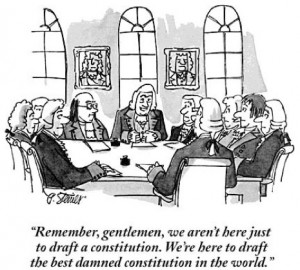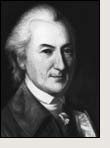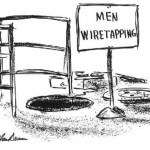By Moyra Schauffler, ’15
The Constitution Day Address at the Clarke Forum for Contemporary Issues entitled, “Government Surveillance and the Bill of Rights”, given by Kate Martin of the Center for National Security Studies, focused on the history and constitutionality of government surveillance in the United States and what effect the surveillance has had on the American population. To begin the lecture, Martin linked the fear felt by the founding fathers, of European “surveillance” of their newly independent nation with modern-day surveillance of electronic communications and the apprehension created by scandals, such as the one involving Edward Snowden. Martin spent the majority of the address discussing the history of the Constitution’s Fourth Amendment and its application to contemporary government surveillance. The most persuasive aspects of the lecture were the discussions of fear felt by Americans both in the past and present regarding government surveillance, the Fourth Amendment, and how that change to the Constitution applies to security of the nation today.
The first connection Martin made between historical and modern surveillance referenced John Dickinson and his 1774 drafted petition, in the interest of the First Continental Congress, to King George III. Martin said the petition was meant to encourage the Crown to, “repeal various oppressive laws”, and to quote John Dickinson, “leave to lay our grievances before the throne”. Martin then went on to describe that this petition aimed to stop, in the words of Dickinson, “The officers of the customs” who were, “empowered to break open and enter houses without the authority of any civil magistrate founded on legal information.” By referencing John Dickinson, Martin not only appealed to the audience members directly connected with Dickinson College, but she also alluded to the fear of outside influence and surveillance that gripped the framers of the Constitution, much as it does people today.
George Herring also describes this fear of foreign control within the borders of the new nation on page fifty-seven of his work From Colony to Superpower. In this section, Herring lists many of the threats and troubles faced by the Washington administration following the Revolutionary War. In general, the biggest issues confronting the new nation concerned foreign powers’ involvement in North America and the lack of a strong American military or navy to assert the new nation’s independence over its territory. By living through a period under colonization in which “officers” could enter houses without warrant and, after independence, facing European powers that aspired to see the new nation fail, for obvious reasons the founding fathers inserted an amendment into the Constitution that eliminated “unlawful searches and seizures” as a possibility for the American government.
The Fourth Amendment of the United States’ Constitution clearly states the unlawfulness of warrantless “searches and seizures”. By putting this Amendment into the context of the 18th century and the American government’s fear of re-colonization by the British and outside influence coming from other European powers, like France and Spain, one can clearly see the historical fear that the framers of the Constitution had of unfettered government surveillance of the people. However, in terms of modern threats and the “need” for surveillance by the government to keep the country safe, the question of what constitutes “unreasonable searches and seizures” becomes more complex and nuanced in the 21st century.
Martin continued her lecture explaining that, as communication technology improved throughout the 20th century, the National Security Agency (NSA) began carrying out secret “wiretaps”, or the monitoring of telephone calls, on American citizens within the borders of the United States. Wiretapping became a controversial topic in terms of civil liberties because those against the practice deemed it unconstitutional under the Fourth Amendment and those in favor argued that the wiretaps were necessary for national security purposes. Finally, the Supreme Court, who had abstained from making decisions on the constitutionality of wiretapping ruled in United States vs. United States District Court (1972) that wiretaps were unconstitutional. This controversy only escalated as electronic communication technology skyrocketed towards the end of the 20th and throughout the first decade of the 21st century. In trying to determine the constitutionality of wiretapping and modern electronic communications, such as email and text messages, one has to assess contemporary threats to the nation.
Today, for the most part, Americans do not have to worry about soldiers entering their houses and seizing their possessions without warrant. Instead, Americans must be apprehensive of government workers having the ability to monitor their communications with people both inside and outside American borders. Now that Americans know agencies like the NSA have this capability, the question of “why?” arises. Modern threats to the nation are overwhelmingly asymmetrical compared to 18th century threats. Terrorist groups like Al Qaeda are a different kind of adversary of the United States than a sovereign nation such as Great Britain. In assessing these menaces, we as a nation must decide whether these new kinds of threats are worth the increased potential of government surveillance on the American population.
Clearly, whether we should allow more surveillance or not, and perhaps a weakening of the Fourth Amendment, is something that needs to be transparently discussed at all levels of government and civil society. As Kate Martin concluded the Constitution Day Address, she stated, “There are certainly real threats, the potential for abuse is, as Richard Clarke describes it, a potential for a police state.” These words summed up Martin’s argument of the problems raised by government surveillance in regards of civil liberties and probed the listener to imagine how the framers of the constitution would address the apprehension and fear created by warrantless surveillance on the American population.




Leave a Reply